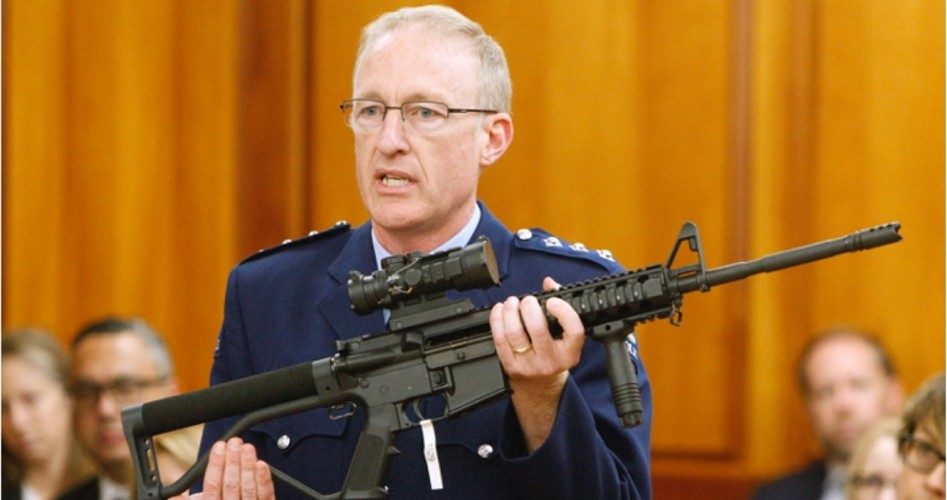
The government of New Zealand is claiming success after its mandatory gun-buyback program, which ended Friday, took about 56,000 firearms out of circulation. But not everyone is convinced that the program even came close to achieving its objectives, much less that it has made the island nation a safer place.
The buyback program was instituted after the March 15 mass shooting in Christchurch, which left 51 people dead. Prime Minister Jacinda Ardern took the occasion to ban semiautomatic and “assault” weapons, then used the carrot of taxpayer money in an effort to induce owners of the banned weapons to turn them in. According to the Washington Post, “Compensation rates range[d] from 95 percent for new or near-new weapons to 25 percent for those in poor condition.”
Police Minister Stuart Nash announced Friday the government had bought 56,000 firearms from roughly 32,000 people, while an additional 188,000 “prohibited parts … such as high-capacity magazines and pistol grips” had also been turned in, reported New Zealand’s 1 News. Nash also said 1,800 firearms had been “seized from gangs and other offenders since March.”
“From tomorrow gun owners will not be paid for their prohibited firearms. The buyback will be over,” he added. “Those in breach of the law face risk of prosecution and up to five years jail, as well as the loss of their license.”
Whether the program really brought in most of the banned weapons remains a matter of speculation. The government doesn’t know how many such weapons were in circulation prior to the buyback. In a government-commissioned study, accounting firm KPMG estimated the number to be between 50,000 and 170,000. The Council of Licensed Firearms Owners (COLFO), New Zealand’s largest gun-rights organization, believes KPMG’s highest estimate to be accurate.
Nash, naturally, declared the program a success. “I just do not believe there’s 170,000. I believe we’ve got the majority of these guns in,” he told 1 News last Tuesday. He did admit, however, that he really doesn’t know if the program was successful because there is no national gun registry, though Ardern is trying to push through legislation to institute one. “This is why we need a register,” he explained, “to enable police to better track firearms.” (Left unsaid was the fact that, as Miguel Faria, Jr., observed, “gun registration is the gateway to civilian disarmament.”)
COLFO, on the other hand, called the program an “unmitigated failure.” The group said gun owners have been “hiding valuable firearms, protecting family heirlooms, and being ignorant of the fact they are affected by the new bans.”
Besides widespread, longstanding gun ownership among New Zealanders, albeit mostly those in rural communities, COLFO and other naysayers blame political bungling for what they see as the program’s failure to achieve its aims.
“It’s clear why only a small number of firearms have been handed back and it’s on the government that rushed the process, wasn’t clear on requirements, changed the prohibited list during the program and failed to engage with the firearms community,” said National Party spokesman Mark Mitchell.
On top of that, armed police patrols, which were instituted in some cities in October, “have already featured in two fatal encounters,” noted the Post.
In addition, the government’s online gun registry was found to be far from secure, making it “a shopping list for criminals,” according to COLFO spokeswoman Nicole McKee.
“There will be a number of good people who will be made criminals by this government’s arrogance, and this is the new normal,” McKee told 1 News.
“Why would they hide [their guns]?” she asked. “They’re angry, they’re angry at the mistreatment that they have received and the blame [they] have received for an event they did not do.”
That, of course, is the way governments always operate. They take advantage of crises, often ones resulting from their own failures, to hack away at their citizens’ liberties. Kiwi gun owners had exactly zero to do with the Christchurch massacre, which appears to have been perpetrated by an Australian, Brendon Tarrant, who was apparently hoping to bring about a gun crackdown. Unfortunately, as Travis Poulson of Auckland told the Post, “It is the public that are paying the price through no fault of their own.”
Photo: Police acting superintendent Mike McIlraith shows New Zealand lawmakers AR-15 style rifle, April 2, 2019: AP Images
Michael Tennant is a freelance writer and regular contributor to The New American.


